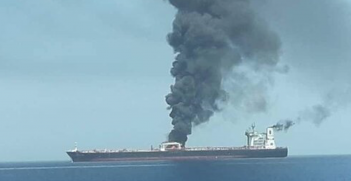Trump and Iran: Making a Bad Situation Worse

The July 2015 nuclear agreement between Iran and the international community — the Joint Comprehensive Plan of Action — was significant in that it demolished fears of an Iranian nuclear weapons programme and exposed that country’s civil nuclear programme to thorough international scrutiny. In so doing, it should have removed a major source of tension and instability in the Persian Gulf.
The way in which the agreement was negotiated also provided a model for addressing other problems in that region and beyond. By engaging countries with valid interests in the outcome of negotiations and by showing a willingness to compromise, the participants were able to build trust and thereby address hitherto intractable issues associated with concerns for national security and pride. Importantly, the agreement, not a formal treaty, relied on the political will of those involved: a great strength but, as we are now seeing on the part of the US, also a weakness.
One of the consequences of the nuclear agreement was to complete the process begun during the 2003 American invasion of Iraq of releasing Iran from decades of isolation and to encourage forces of moderation in that country. Without any effort on its part, Iran’s threat in the west, Saddam Hussein, and in the east, the Taliban, were removed and replaced by US forces. The ensuing potential threat from American forces in Iraq and Afghanistan was stillborn as the US became bogged down in Iraq’s civil war. The easing of Iran’s sense of siege saw moderate forces gradually assume greater confidence, leading eventually to the election of President Hassan Rouhani. A key plank in Rouhani’s election platform was that economic recovery depended on improved relations with the West and a solution to the dispute over nuclear weapons.
Trump’s Objectives
President Trump has set out to reverse all this. In his enthusiasm to wind back the achievements of the Obama administration, Trump has resolved to create an economic wall around Iran and to harden Arab attitudes towards their Persian neighbour. He has weakened the nuclear agreement despite the concerns of its other parties. Trump has also emboldened Iran’s neighbours, specifically Saudi Arabia and the United Arab Emirates (UAE) and, more generally, in promoted authoritarianism across the region.
Trump’s objectives are not easy to discern but they seem to combine the political and the personal. He has set out through draconian economic sanctions and military threats to stifle Iranian ambitions to hegemonic status in the eastern Middle East, a role it has exercised throughout history. To that end, he has encouraged the unlikely coalition of Saudi Arabia, UAE, Egypt and Israel to resist Iranian ambitions. Some of his actions seem to be designed to provoke a violent Iranian response.
He is clearly a close friend and political ally of Israel’s Prime Minister Benyamin Netanyahu. With Trump’s implicit endorsement, Netanyahu has effectively abandoned negotiations with the Palestinians, a position that will be confirmed when Trump’s son-in-law, Jared Kushner, submits a plan for the region which is expected to be heavily weighted against Palestinian interests.
Trump has important business interests in Saudi Arabia and the UAE and these considerations seem to be influencing some of his decisions. The Administration’s response to the murder of Saudi journalist Jamal Khashoggi and the issue of arms sales to Saudi Arabia and the UAE reinforce this perception.
Trump seems intent on reducing direct American military engagement in the region. He has left Syria to the tender mercies of the Russians and Iranians and seems to think that the Saudis and Emiratis can act as his deputy sheriffs, roles that they are ill-equipped to perform.
In response, Saudi Arabia and the UAE have pursued regional roles in Syria, Yemen, Somalia, Sudan and Libya. Their brutal prosecution of the war in Yemen has been widely condemned for their indiscriminate human rights violations. The two countries have aggressively sought to expunge any residue of the democratic impulse on display across the Middle East in 2011. For example, following the removal of Sudan’s President Omar Al-Bashir in April the Saudis quickly offered the transitional military government substantial financial aid. Their goal was to prevent the emergence of a democratic system in the country.
In Egypt, Trump’s policies have aided the establishment of possibly the most vicious dictatorship in modern Egyptian history. The government of Abd Al-Fattah Al-Sisi has sought to consolidate its control through a campaign of disappearances, arbitrary arrests, torture and widespread violence against anyone who might be seen as a critic.
All theses countries have used resistance to Iran and terrorism as a justification for their behaviour. Netanyahu, who has always used Iran as a distraction from domestic challenges, claims that Iran remains intent on destroying Israel. He points to the alleged presence of elements of the Iranian Revolutionary Guard in the Syrian Golan Heights area as evidence of that goal. Trump has implicitly given Netanyahu free rein to act against Iran or its allies.
Iran’s Reaction
In foreign policy terms, the major division in Iranian politics has been between those who support engagement with the West and those who remain doubtful of the reliability of the US as a negotiating partner. Trump’s behaviour seems to bear out the suspicions of those elements who opposed the nuclear agreement and engagement with the West.
The Rouhani administration has resisted pressure to walk away from the nuclear agreement but recently announced its decision to increase the amount of enriched uranium it produces. Germany’s Foreign Minister, Heiko Maas, visited Tehran on 10 June to urge Iran to continue to adhere to the agreement.
Regional Prospects
The Middle East has become a more dangerous place than any time since the Bush administration was rampaging around Iraq. The situation has been aggravated by the activity of Trump’s National Security Adviser, John Bolton, who has long advocated military action against Iran and Secretary of State Pompeo, who advocates the vaguer idea of “maximum pressure.” The risk of a relatively minor incident developing into a significant escalation is causing real concern.
There are, however, some glimmers of hope. Iranian governments are inherently cautious and there have been numerous occasions when Iran has stepped back from escalation following provocations. Moreover, Iran is aware of its military weakness compared to the US and its neighbours.
The Iran nuclear agreement may yet survive. The European Union, Russia and China have been working to hold the deal together and Trump may be satisfied if the fingerprints of Barak Obama are purged and Iranian defensive capabilities significantly degraded.
Despite his bellicose statements, Trump seems to be disinclined to resort to force. He has gone so far as to offer to negotiate with the Iranians in what would appear to be a major easing of the US position. Indirect negotiations have already taken place through the good offices of Japan’s Prime Minister Abe Shinzo. The US and Iran have also been indirectly involved in negotiations over a maritime boundary dispute between Lebanon and Israel.
It’s not a promising scenario but one that might indicate that the efforts of those who have been counselling restraint will act as a brake on Trump’s behaviour.
Dr Anthony Billingsley is a Lecturer of International Relations at the School of Social Sciences, Faculty of Arts and Social Sciences, UNSW. His main research focus is the Middle East and international law.
This article is published under a Creative Commons Licence and may be republished with attribution.





